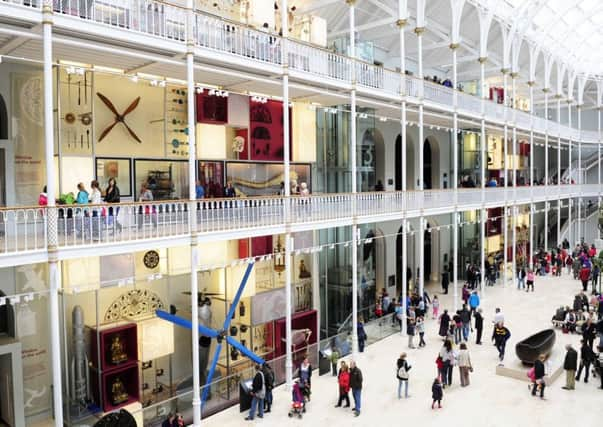Why we need to give kids the freedom to learn for themselves - Cameron Wylie


Now, my personal view is that young people today are fairly glorious – relative to say, my own generation, when we were young (in a dark age of black and white tellies, no central heating and three types of fruit in the Co-op). They are variously kinder, more interested, broader of mind, much more creative and dress better.
But, it pains me to admit this, sometimes they do fall apart unexpectedly and they are, I believe, a bit afraid. Now, why would this be?
Advertisement
Hide AdAdvertisement
Hide AdHere’s a story. Recently I saw a friend of mine, the daughter of a much-loved colleague whose family I have been close to for decades. However, I hadn’t see her for a while so it was a particular pleasure to have lunch with her, her husband and her two kids, aged 13 and 10, neither of whom I had previously met. They were brilliant young people – clever, funny and exactly aware of their role in a lunchtime conversation among four adults, several of whom were quite noisy people. There may have been some drink involved. I commented on their excellence and their Ma told me an astonishing thing.
The previous weekend their 10 year old, Murdo, had got up on a breezy Saturday morning, got on his bike and gone to the Museum of Scotland. She and Dad were still in their jammies when the phone rang – a security person from said Museum. My friend established immediately, of course, that nothing was wrong with Murdo – no, nothing was wrong, but he was in the Museum…alone…Yes, that was right, Mum replied, he had gone to the Museum. Well, apparently, he’s not allowed in the Museum at his age, alone; indeed, young people are not allowed in the Museum alone until they are…18! You can see why, the security guard opined – ‘Anything could happen…’. ‘Yes,’ Murdo’s mum replied, ‘he might learn something’.
I have told this story to a number of my friends who have children. My shock is met with rather tight lips, with several of them saying that they would never let a child of that age do something like that by themselves. I am reduced to a silent, head-shaking, disbelieving old man. Yet, I do recall lots of discussions with parents at the school of which I was Principal, about the convoluted journeys taken in the mornings or evenings to prevent Charlie or Charlotte from having to get the bus to or from home.
‘We might let her travel by herself when she’s in S3’ was not untypical. In S3 Charlotte would be 15, a year away, potentially, from marriage. At the same time as secondary age kids are still being ferried by the team of chauffeurs and security personnel their parents become, schools are frantically running classes in ‘resilience’ or ‘grit’ or ‘independent living’, taking children and abandoning them on hillsides with only a luxury padded sleeping bag for comfort when many of them aren’t allowed to touch the cooker at home. My goodness, sometimes parents won’t even let their aspiring university students write their own ‘Personal Statement’ for entry to uni….
Inevitably this leads to the ‘when I was young we lived in a cave and ate rats’ ‘Rats! You were lucky. We dreamt of rats’ etc etc exchange. However, please let me proceed. I had a relatively well-off childhood, and I went to a private school in Edinburgh. We lived in West Lothian, and we did not, in my early school years, have a car. My brother, four years my senior, took me to school, mostly against his will, but he did it. However, when I was in P1 (and 5 years old) I got out an hour earlier than he did, and, surprise surprise, there was no ‘Wrap Around Care’ in 1962…
So, in the first month, my father came and got me, and slowly but surely, I learned the route home: down the Vennel steps; the 2 or 2A to Haymarket; cross the road; the 38 bus to Stirling or Crieff or Callander. Get off in Kirkliston. Cross the road to the house. I was doing this by myself when I was 6 and I was far from alone in that. And before people start saying, yes, but these were kinder, less dangerous times, there’s actually no evidence for that. I accept that people might be less inclined to assist a child who has, say, fallen off his bike, but still, most people would, plus there is the added security of that work of the devil, the mobile phone. The six year old me, chatty to a fault, was looked after by bus personnel, old ladies, and all my fellow passengers. No-one thought it was odd.
We have just been in Japan, which was, dear reader, fabulous. Our guide, Meg-san, was a highly astute, interesting and honest person who illustrated aspects of Japanese culture with anecdotes from her own life – driving in Japan, the embarrassment of not eating your sushi properly, one’s relationship with one’s parents-in-law etc. She was divorced, she told us, and lived with her six year old son, who took the train to school every day by himself. Here, in Scotland, the Social Services would be at her door. We should start the liberation and strengthening and resilience of our young people by determining that, at least at secondary level, they travel to school by themselves; they make their own lunches; they buy their own presents for Granny; they go to University Open Days by themselves. Our museums and galleries positively need to encourage children aged over, say, 10, to come and learn, even if that requires special openings for them to do so. Murdo! Back on your bike, boy!